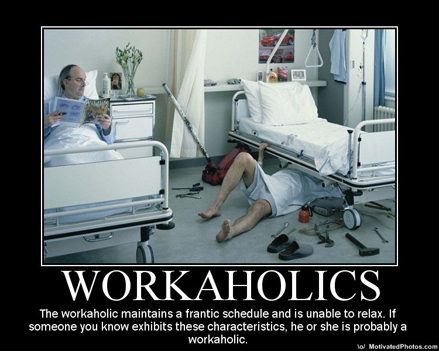
@radiobrendan
It’s generally not seen as a good thing to be a ‘holic’ of anything. Everything in moderation and all that.
Yet in today’s world, it seems that being a workaholic is almost universally accepted and even expected in some quarters. And of course in jobs where the latest communication technology is utilised to get things done, it’s easier than ever to be ‘able’ to work 24/7.

Indeed … (Image from hmmagazine.com.)
This is something some people appear to have embraced. It has certainly blurred the lines between off-duty and on-duty. If you don’t actually turn off the technology at your fingertips, you’re effectively always ‘on’ to answer work queries, deal with existing clients, negotiate with potential new ones, write e-mails and such like.
Anecdotal evidence suggests that a lot of people can’t resist the temptation to answer that work-related e-mail or WhatsApp message or whatever, regardless of what time of day or night it is and the amount of time they’ve already worked.
Now if you’re self-employed and/or freelance, and depending on the type of work involved, your day may not have a clear schedule to it. In such a scenario, in order to find that often talked about but seldom found work-life balance, it’s important to monitor the hours you work on various projects. Those you work with must realise that you have your downtime, if you want it that is. For freelance types, the distinction between work hours and free time can become difficult to decipher.

Drawing from criticallyrated.com.
The blurred work lines, though, are at their most dangerous for direct employees of companies, especially those who should have a clearly demarcated work schedule and place. When you’re at home, having done your lot, responding to work-related queries shouldn’t become a regular practice. Some people, however, just can’t resist; and increased stress levels (and related health problems) can be a direct result of ‘engaging’ round the clock.
The argument could be made that if you’re a manager, the above is par for the course. Yet unless it’s explicitly written in your contract, it shouldn’t have to be that way.
In fact, looking at the workaholic in terms of spending time at their workplace, a former boss in Ireland used to ask us newsroom employees, when we were working late, ‘What are you still doing in the office at this time?’ He would see it as a sign of inefficiency. Of course, we couldn’t plan when news would happen, but he had a point all the same. A lot of Colombian bosses could learn from that, something touched on before on this blog.
Another side to all this is the people who work in something they genuinely love, where the word ‘work’ doesn’t conjure up negative images. Be that as it may, forcing a break or change is generally a good practice, if only just to aid productivity, to return to your ‘thing’ with more vigour, so to speak.
It’s unlikely that we’ll start viewing the workaholic in the same shady light as we see the alcoholic any time soon. But at least we could start re-appreciating those who seek to ‘work less and earn more.’ And in some respects, more gets achieved that way.
________________________________________
Facebook: Wrong Way Corrigan – The Blog & IQuiz «The Bogotá Pub Quiz».



Comentarios